My Dark and Ruinous Descent into Science Fiction, Fantasy, and Horror


The very first movie I ever remember going to a theater to see was 'Escape
From the Planet of the Apes'. I didn't get the attempts at sly social commentary back then; all 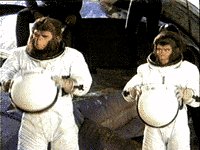 I knew was that it was about talking chimpanzees who crawled out of a spaceship and visited
the world with which I was familiar, but at the time that was enough. From then on, I was hooked
on anything having to do with science fiction and horror. I couldn't wait to run out to the used
bookstore out on the corner and spend a hard-won quarter on whatever paperback had the
coolest-looking cover (for those books there that actually still had covers, that
is). I lucked out in that my primary reading material consisted of novels and stories by
writers such as Robert Heinlein, Larry Niven, Ray Bradbury, and Issac Asimov, although it
wasn't long before I read my first Harlan Ellison story, and he's been my favorite writer
ever since.
I knew was that it was about talking chimpanzees who crawled out of a spaceship and visited
the world with which I was familiar, but at the time that was enough. From then on, I was hooked
on anything having to do with science fiction and horror. I couldn't wait to run out to the used
bookstore out on the corner and spend a hard-won quarter on whatever paperback had the
coolest-looking cover (for those books there that actually still had covers, that
is). I lucked out in that my primary reading material consisted of novels and stories by
writers such as Robert Heinlein, Larry Niven, Ray Bradbury, and Issac Asimov, although it
wasn't long before I read my first Harlan Ellison story, and he's been my favorite writer
ever since.
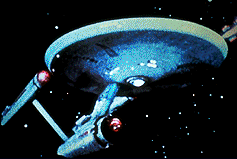 One of the few advantages of being a child of the 1970's was that it was such a
breakthrough decade for science fiction. True, the original Star Trek had just
been cancelled, but that's because it was ahead of its time. The vast majority of the viewing
public never gave it a chance because they assumed it was some goofy space show, not realizing
that it was really about Vietnam, civil rights, the counterculture, political corruption, and
plenty of other subjects that were central to so many people's lives at the time. Ironically,
the great strength of science fiction is exactly what caused the show's downfall.
One of the few advantages of being a child of the 1970's was that it was such a
breakthrough decade for science fiction. True, the original Star Trek had just
been cancelled, but that's because it was ahead of its time. The vast majority of the viewing
public never gave it a chance because they assumed it was some goofy space show, not realizing
that it was really about Vietnam, civil rights, the counterculture, political corruption, and
plenty of other subjects that were central to so many people's lives at the time. Ironically,
the great strength of science fiction is exactly what caused the show's downfall.
What is this 'great strength'? Well, science fiction provides a ready-made environment in which it's safe to ask questions that might be dangerous when asked in real life. The above mentioned subjects, particularly those concerning Vietnam and civil rights, were generally taboo as far as television entertainment was concerned. Unlike today, when it's fine to have 'very special episodes' about questions that confront society in even the most banal sitcoms, serious questions were completely outside the realm of prime time entertainment. Science fiction, by virtue of the alternate settings and time frames it provides, allows the creator to 'have his cake and eat it, too'. The serious questions can be asked without seeming to be done in a threatening manner - after all, it's just science fiction.
 That's the primary bad thing about Star Wars coming as it did toward the
end of the 1970's. It did plenty of good, true, and was wonderful entertainment as well, but
it neglected this same strength of science fiction, electing
That's the primary bad thing about Star Wars coming as it did toward the
end of the 1970's. It did plenty of good, true, and was wonderful entertainment as well, but
it neglected this same strength of science fiction, electing instead to recycle themes that
have been around since at least ancient Greek times. Don't get me wrong, now - I still love
the movie (although The Empire Strikes Back is still without a doubt and by far
the best of the three), but on an analytical level, it was all mashed potatoes with no meat.
Close Encounters of the Third Kind, on the other hand, had the courage to ask
questions about humanity's place in the universe similar to those asked in
2001: A Space Odyssey ten years earlier, and not until Contact
twenty years later has there been anything of a similar nature at a similar level.
instead to recycle themes that
have been around since at least ancient Greek times. Don't get me wrong, now - I still love
the movie (although The Empire Strikes Back is still without a doubt and by far
the best of the three), but on an analytical level, it was all mashed potatoes with no meat.
Close Encounters of the Third Kind, on the other hand, had the courage to ask
questions about humanity's place in the universe similar to those asked in
2001: A Space Odyssey ten years earlier, and not until Contact
twenty years later has there been anything of a similar nature at a similar level.
Now it's time for me to reign in my tendency to preach and try to remember what I was talking
about here. Ah, fantasy. Actually, I never read all that much, although I did discover something
as a child that caused it to have a huge influence on my life anyway, and that, of course,
was Dungeons and Dragons. A friend of mine started playing, and a few weeks later on a Saturday
morning I went with him to his group's session and ended up playing straight through until
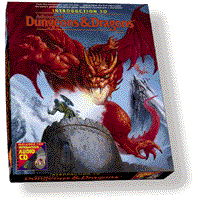 Sunday night. Addictive as hell, it was - killing monsters, playing the part of someone else,
getting frustrated with how things were going with our hearty band of adventurers and
contemplating putting the Dungeon Master's eyes out with the four-sided dice. Then, the tide
turned. Religious groups started trying to tell us that we were being brainwashed by tools
of Beelzebub (who actually ended up as a character in one of our campaigns, and we kicked his
ass!), but fortunately we prevailed by working other games into our activities, such as
Runequest (which still had gods, so our parents were kind of cautious about that) and Traveller,
a science fiction role-playing game that, other than the setting, worked in the same way as
did D&D in principle. It was simply a more sophisticated way of dreaming up our own stories -
interactive storytelling before there was such a thing. It's been a very long time since I've
picked up any dice to play anything other than Monopoly (and it's been a long time since I've
even done that, now that I think about it), but I'll always have fond memories of my
adventures in that particular playground of the mind.
Sunday night. Addictive as hell, it was - killing monsters, playing the part of someone else,
getting frustrated with how things were going with our hearty band of adventurers and
contemplating putting the Dungeon Master's eyes out with the four-sided dice. Then, the tide
turned. Religious groups started trying to tell us that we were being brainwashed by tools
of Beelzebub (who actually ended up as a character in one of our campaigns, and we kicked his
ass!), but fortunately we prevailed by working other games into our activities, such as
Runequest (which still had gods, so our parents were kind of cautious about that) and Traveller,
a science fiction role-playing game that, other than the setting, worked in the same way as
did D&D in principle. It was simply a more sophisticated way of dreaming up our own stories -
interactive storytelling before there was such a thing. It's been a very long time since I've
picked up any dice to play anything other than Monopoly (and it's been a long time since I've
even done that, now that I think about it), but I'll always have fond memories of my
adventures in that particular playground of the mind.
As far as horror is concerned, well, who doesn't love to be scared, as long as it's with
the knowledge that what's scaring you is something you can put down while you go outside to
 feed the dogs or to the kitchen to make a sandwich. Although there are plenty of big names in
horror fiction, the one at the top
feed the dogs or to the kitchen to make a sandwich. Although there are plenty of big names in
horror fiction, the one at the top 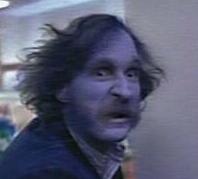 is certainly Stephen King. The Stand is a
classic that, in my mind, will never be topped. I can also say that the first six or so chapters
of Dean Kootz's Phantoms is among the scariest stuff I've ever read, although if
memory serves, it started to fall apart toward the end of the book. I also like a lot of the
work by Robert Bloch, Robert McCammon, and Clive Barker. While The Exorcist gets my vote as the scariest movie of all time, my favorite horror movie is
Dawn of the Dead, a zombie movie about how, if the dead ever walk the earth,
they'll be fighting over the bones of the living while the living will be fighting over the
remains of society and its symbols (including color TVs, caviar, and the most priceless prize
in a fallen consumer society - shopping malls).
is certainly Stephen King. The Stand is a
classic that, in my mind, will never be topped. I can also say that the first six or so chapters
of Dean Kootz's Phantoms is among the scariest stuff I've ever read, although if
memory serves, it started to fall apart toward the end of the book. I also like a lot of the
work by Robert Bloch, Robert McCammon, and Clive Barker. While The Exorcist gets my vote as the scariest movie of all time, my favorite horror movie is
Dawn of the Dead, a zombie movie about how, if the dead ever walk the earth,
they'll be fighting over the bones of the living while the living will be fighting over the
remains of society and its symbols (including color TVs, caviar, and the most priceless prize
in a fallen consumer society - shopping malls).
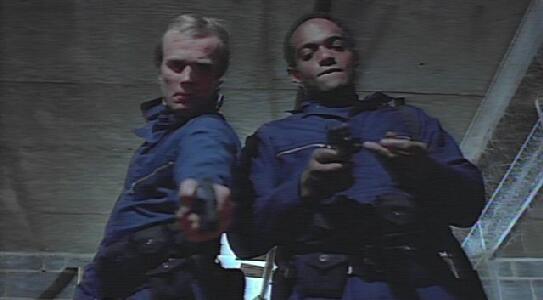
These days, my favorite TV show is, of course, The X-Files. I've been watching it faithfully since its premiere, and unlike many of its fans and current critics, I think it's only gotten better. The decades that have followed the assassinations of the 1960's and the scandals of Watergate and Iran-Contra (I don't include any of the latest news from D.C. because these scandals seem to primarily involve who's been trying to do who, so while they may prove to be serious, they're not on the level of any kind of nationally held secrets and power brokering - at least not currently) have forced us to take a closer look at the operations of our government, and actually encourage us to look beneath the surface to try and figure out what's really going on. In this kind of social environment, The X-Files came along at the perfect time, quickly becoming that proverbial mirror of reality that good fiction can become.
Okay. Enough of my ranting about society. Just a few more things about me here...
I finished a Bachelor of Science degree and then a Bachelor of Science in Education degree, both in mathematics (getting certified to teach physics at the same time), and I'm currently finishing a master's degree in mathematics (what did you expect after two undergraduate degrees in math? Marine biology?). I'm picking up more concerning HTML and general webpage design on a more or less daily basis, and it just gets more interesting and fun to do. During my first year in college, I was an English major, and my goal in life was to become a published author. Well, my literary aspirations have passed by the wayside (except for specialized mathematical journals, that is), but here I am, an author with my words and thoughts published on the world wide web. Although I'm a teacher who's supposed to be carefully measured in my thoughts and actions, my nearly speechless reaction to that knowledge is to just say... "Kewl, huh?" Furthermore, the mere existence of the internet is, I believe, the greatest asset we could ever have. We've always lived in a global community, but it's only now that we have the ability to realize that fact and to act accordingly. I've met and become friends with people not just throughout the US, but with people all over the world. With this knowledge, it becomes that much more obvious to me that those who rant about how the internet is nothing more than a pit of pornography and hatred simply don't know the first thing of what they're talking about.
Well, that's me. Feel free to comment by signing my Guestbook or sending me a message (Ah loves, Ah say, Ah loves to git that there e-mail), and thanks for your time.


Back to my Home page
As of now, brave souls have ventured into this dark and scary realm.

This page hosted by
![]() Get your own Free Home Page
Get your own Free Home Page